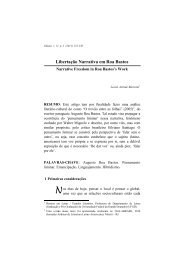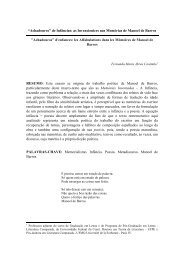baixar artigo completo em pdf
baixar artigo completo em pdf
baixar artigo completo em pdf
You also want an ePaper? Increase the reach of your titles
YUMPU automatically turns print PDFs into web optimized ePapers that Google loves.
NICHOLLS, P. Mainstream writers of SF. In: CLUTE, J.; NICHOLLS, P. (orgs.). The<br />
encyclopedia of science fiction. New York: St. Martin’s Griffin, 1995.<br />
ORTIZ, G. Heterogeneidade. In: FIGUEIREDO, E. (org.). Conceitos de literatura e<br />
cultura. Niterói: EdUFF, 2010.<br />
PEREIRA, F. C. G. Fantástica marg<strong>em</strong>: o cânone e a ficção científica brasileira.<br />
Dissertação de mestrado <strong>em</strong> Estudos da Literatura. Rio de Janeiro: PUC-RJ, 2005.<br />
REIS, C. O conhecimento da literatura: introdução aos estudos literários. Coimbra:<br />
Almedina, 2001.<br />
RODRIGUES, A. C. O autor e a obra. In: LODI-RIBEIRO, G. Xochiquetzal: uma<br />
princesa asteca entre os incas. São Paulo: Draco, 2009.<br />
SARTRE, J.-P. Que é a literatura?. Trad. Carlos Felipe Moisés. São Paulo: Ática,<br />
2004.<br />
SHAVIRO, S. The Singularity is Here. In: BLOUD, M.; MIÉVILLE, C. (orgs.). Red<br />
planets: marxism and science fiction. Middletown: Wesleyan University Press, 2009.<br />
STEPHENSON, N. Nevasca. Trad. Fábio Fernandes. São Paulo: Aleph, 2008.<br />
TAVARES, B. Brazil. In: CLUTE, J.; NICHOLLS, P. (orgs.). The encyclopedia of<br />
science fiction. New York: St. Martin’s Griffin, 1995.<br />
_____. O rasgão no real: metalinguag<strong>em</strong> e simulacros na narrativa de ficção científica.<br />
João Pessoa: Marca de Fantasia, 2005.<br />
ABSTRACT: Nowadays it is possible to recognize in Brazilian science fiction<br />
production three major tendencies: 1) alternative history, including recent steampunk<br />
fever; 2) cyberpunk fiction; and 3) borderline fiction (works in the border between<br />
science fiction and mainstream fiction). These three tendencies begun in the Second<br />
Wave of Brazilian Science Fiction, in the 1980’s. Each tendency is represented by the<br />
authors Gerson Lodi-Ribeiro, Fausto Fawcett and Braulio Tavares, respectively.<br />
Besides commenting on some of the early published works by new and old authors of<br />
three tendencies – the alternative histories by Gerson Lodi-Ribeiro (Xochiquetzal, 2009)<br />
and by Roberto de Sousa Causo (Selva Brasil, 2010); on the the cyberpunk fictions by<br />
Fábio Fernandes (Os dias da peste, 2009) and by Richard Diegues (Cyber Brasiliana,<br />
2010); and on the borderline fiction by Luiz Bras (Paraíso líquido, 2010) –, the aim of<br />
this paper is to relate th<strong>em</strong> to post-modernism, d<strong>em</strong>onstrating that this artistic and<br />
cultural mov<strong>em</strong>ent is the common determination of the present production: thus,<br />
alternative history approaches to a poetics of postmodernism that Linda Hutcheon<br />
nominates “historiographic metafiction;” cyberpunk fiction, according to Frederic<br />
Jameson, is the supr<strong>em</strong>e literary expression not only of the postmodernism, but also of






